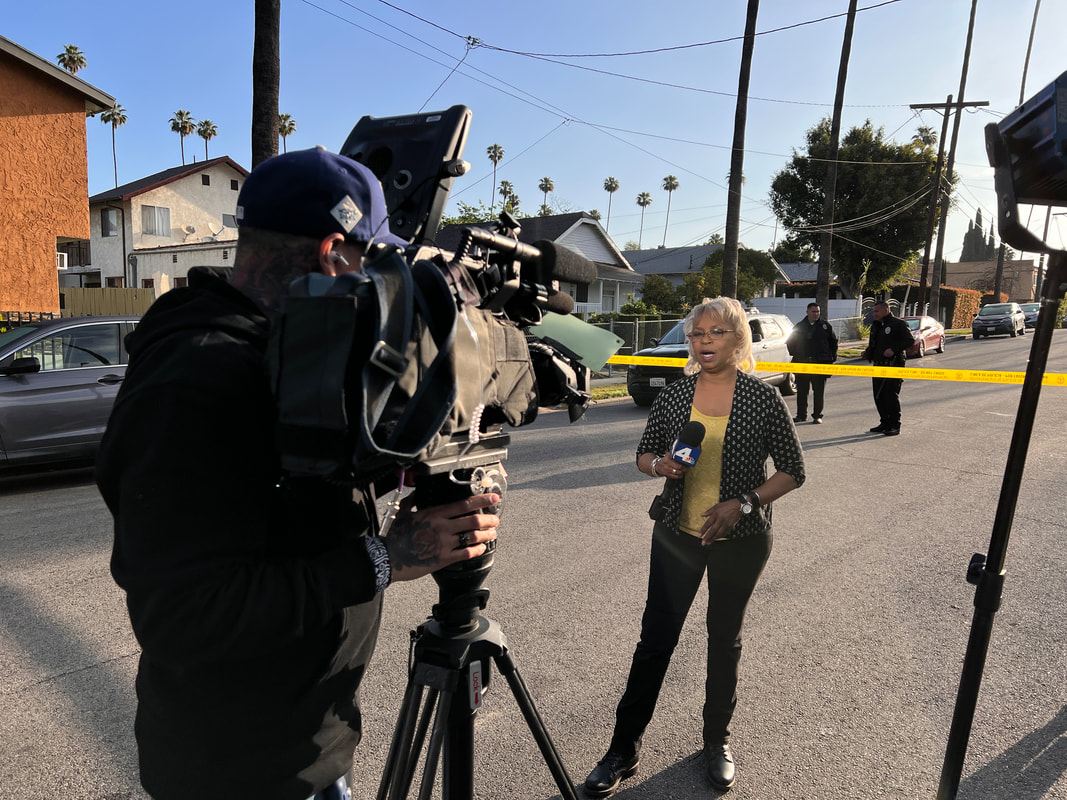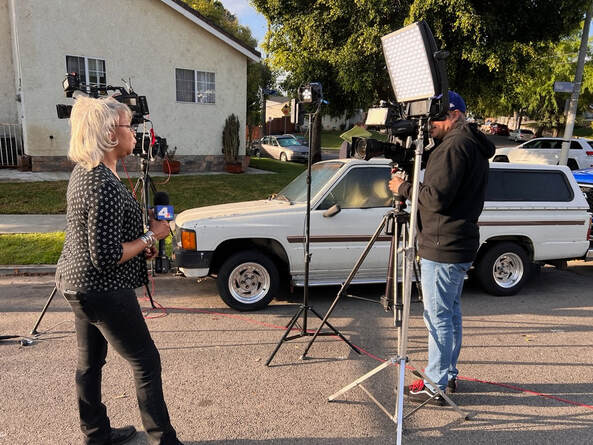You may think that working in news is hard, or maybe easy. You could think it's fun or boring. To know what it's like, I interviewed a news photographer and a reporter about their job, thoughts, and feelings of what it is like in the news industry. --Mackenzie Luna, 6th grade

You may think that working in news is hard, or maybe easy. You could think it's fun or boring. To know what it's like, I interviewed a news photographer and a reporter about their job, thoughts, and feelings of what it is like in the news industry.
Rene Luna is a news photographer, and editor for KNBC. Luna works in Universal City, LA California, and described to me why he wanted to work in news. “Since high school I had a fascination for cameras and current events, and I like to be in the middle of the action,” Luna stated.
Toni Guinyard is an assignment reporter. “I go out, and I am assigned stories. I talk to people, like the public and officials, write stories and deliver stories,” she explained. “I see news as a platform for other people to get stories.”
I asked Guinyard if she likes her job and she responded definitively. “Love my job, otherwise, I would not be here. I love telling people the truth, and finding info people overlook.”
Luna weighed in on how he feels about his safety at home and at work. “Yes, all the time safety is my number one concern every day on the job. Especially since I work the overnight shift, 2:00 AM through 12:00 PM or later.”
Luna described moments in work that made him think about leaving. “When I got robbed (my camera was stolen) I wanted to leave. Also, protests and people turning anger towards the media and dealing with endless harassment made me want to leave as well.”
“Dealing with harassment from people who don’t view the media in a friendly light, and dealing with stories that involve death.” Luna explained what the hardest part about his job is.
Guinyard added that the most challenging thing about her job “ is putting together a comprehensive story under a deadline, it's a lot of pressure, and then they keep coming. Also dealing with people who are in a miserable situation and seeing if they will talk to you.”
In news, you never know what you will be doing, especially in Guinyards line of work, like when covering protests. Guinyard spoke about the scariest part of her job. “Every day is scary, you don't know what you will see. Use fear to help you do work, or let fear make you scared. A scary thing that has happened is at protests. People did not want the media at protests, people were armed, we were threatened, things were thrown at us and you have to learn to talk your way out of lots of situations. Another scary thing is nature. You can’t talk to her, and a fire can come to you, and you can't talk yourself out of that situation.”
Luna shared what he does when he gets to work. “I drive to the station. I get to load my news truck, then do a safety check, wait for my reporter, then go drive to areas, shoot, and go live for the morning show. After that I focus on shooting elements for the 11 A.M broadcast, and then edit and send it in and it goes live.”
As for equipment, Luna has it down. “For work I use a Panasonic broadcast camera, a heavy duty tripod, wireless or hard-wired microphone, a lighting kit and laptop computer to edit my stories. I use a program called Edius to edit,” he explained.
Rene Luna is a news photographer, and editor for KNBC. Luna works in Universal City, LA California, and described to me why he wanted to work in news. “Since high school I had a fascination for cameras and current events, and I like to be in the middle of the action,” Luna stated.
Toni Guinyard is an assignment reporter. “I go out, and I am assigned stories. I talk to people, like the public and officials, write stories and deliver stories,” she explained. “I see news as a platform for other people to get stories.”
I asked Guinyard if she likes her job and she responded definitively. “Love my job, otherwise, I would not be here. I love telling people the truth, and finding info people overlook.”
Luna weighed in on how he feels about his safety at home and at work. “Yes, all the time safety is my number one concern every day on the job. Especially since I work the overnight shift, 2:00 AM through 12:00 PM or later.”
Luna described moments in work that made him think about leaving. “When I got robbed (my camera was stolen) I wanted to leave. Also, protests and people turning anger towards the media and dealing with endless harassment made me want to leave as well.”
“Dealing with harassment from people who don’t view the media in a friendly light, and dealing with stories that involve death.” Luna explained what the hardest part about his job is.
Guinyard added that the most challenging thing about her job “ is putting together a comprehensive story under a deadline, it's a lot of pressure, and then they keep coming. Also dealing with people who are in a miserable situation and seeing if they will talk to you.”
In news, you never know what you will be doing, especially in Guinyards line of work, like when covering protests. Guinyard spoke about the scariest part of her job. “Every day is scary, you don't know what you will see. Use fear to help you do work, or let fear make you scared. A scary thing that has happened is at protests. People did not want the media at protests, people were armed, we were threatened, things were thrown at us and you have to learn to talk your way out of lots of situations. Another scary thing is nature. You can’t talk to her, and a fire can come to you, and you can't talk yourself out of that situation.”
Luna shared what he does when he gets to work. “I drive to the station. I get to load my news truck, then do a safety check, wait for my reporter, then go drive to areas, shoot, and go live for the morning show. After that I focus on shooting elements for the 11 A.M broadcast, and then edit and send it in and it goes live.”
As for equipment, Luna has it down. “For work I use a Panasonic broadcast camera, a heavy duty tripod, wireless or hard-wired microphone, a lighting kit and laptop computer to edit my stories. I use a program called Edius to edit,” he explained.

Guinyard described what equipment she needs to do her job. “To do my job, I need a camera, a partner [Rene], a microphone and a live van. The real equipment is me and Rene, and getting a stranger to talk. Every interview is a gift and they [the people] have to give it to you. We give them a platform to speak on. People doing a story, people asking questions and reporting images, are the real things.”
Luna’s favorite things to do outside work is relax at home with a movie, or go to concerts with friends. His advice for those interested in journalism? “Only if you’re really passionate about storytelling and issues that affect people in this society. ”
One of the craziest things that has happened to Guinyard while working in news. “When I used to work in Orlando, I got sent to cover a liftoff that was at Cape Canaveral. The first time I went I did not know what to expect. We took a helicopter, and where do you think a helicopter would land?”
“On a nearby building with a helicopter pad?”
“Or a nearby airport. But I landed on a small island! A small island! There was a dude there with a tent who was there to take pictures of the launch, he did not look professional. I don’t know how he got there, he must have taken a boat or something, but he took pictures of us as we were reporting. Crazy! News can be kind of an adventurous job. Some days are wonderful.”
Many people in the world, mainly people of color and women, are not always treated as they should be, in other words, fairly. Guinyard spoke about her thoughts on being treated as a woman. “Some days I am being treated fairly, now it has changed. I have been in this business for a while, been here 31 years, but when I started in 1983 it was a different world. I don't think anything is ever fair, the only thing I can do is serve a person. Nothing is really fair, news is an interesting business, I’m there to provide.” She states, “It was very interesting to watch BLM movements, I worked as news was evolving when I started, and you only needed one black person on the air. My heart is where all women on tv have to fight to get on air. Assignments were not fair, women got fluffy stories, and were never considered for hard stories, but lots has changed.”
Guinyard also added something that happens in news. “News changes you, because we see things lots of people don’t see but we have to detach ourselves to put it out as opposed to how it affects us. I give the truth and you decide what to do with the truth.
Overall, news can come with unexpected surprises. News can be depressing, sad, happy and fun. It is very interesting and you never know what will happen while you work in news. It’s a very interesting job, and a tough choice.
Luna’s favorite things to do outside work is relax at home with a movie, or go to concerts with friends. His advice for those interested in journalism? “Only if you’re really passionate about storytelling and issues that affect people in this society. ”
One of the craziest things that has happened to Guinyard while working in news. “When I used to work in Orlando, I got sent to cover a liftoff that was at Cape Canaveral. The first time I went I did not know what to expect. We took a helicopter, and where do you think a helicopter would land?”
“On a nearby building with a helicopter pad?”
“Or a nearby airport. But I landed on a small island! A small island! There was a dude there with a tent who was there to take pictures of the launch, he did not look professional. I don’t know how he got there, he must have taken a boat or something, but he took pictures of us as we were reporting. Crazy! News can be kind of an adventurous job. Some days are wonderful.”
Many people in the world, mainly people of color and women, are not always treated as they should be, in other words, fairly. Guinyard spoke about her thoughts on being treated as a woman. “Some days I am being treated fairly, now it has changed. I have been in this business for a while, been here 31 years, but when I started in 1983 it was a different world. I don't think anything is ever fair, the only thing I can do is serve a person. Nothing is really fair, news is an interesting business, I’m there to provide.” She states, “It was very interesting to watch BLM movements, I worked as news was evolving when I started, and you only needed one black person on the air. My heart is where all women on tv have to fight to get on air. Assignments were not fair, women got fluffy stories, and were never considered for hard stories, but lots has changed.”
Guinyard also added something that happens in news. “News changes you, because we see things lots of people don’t see but we have to detach ourselves to put it out as opposed to how it affects us. I give the truth and you decide what to do with the truth.
Overall, news can come with unexpected surprises. News can be depressing, sad, happy and fun. It is very interesting and you never know what will happen while you work in news. It’s a very interesting job, and a tough choice.


